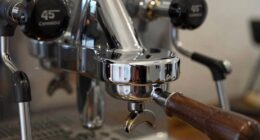If you drink unfiltered coffee like French press or Turkish, you’re consuming higher levels of diterpenes such as cafestol, which can raise your LDL “bad” cholesterol if you’re a regular drinker. Filtered coffee, on the other hand, removes most of these compounds and is generally better for your heart health. Understanding how your brewing method affects cholesterol is important. Keep exploring to learn more about making healthier coffee choices for your long-term well-being.
Key Takeaways
- Unfiltered coffee contains higher levels of diterpenes like cafestol and kahweol, which can raise LDL cholesterol.
- Filtered coffee removes most diterpenes, making it a healthier choice for cholesterol management.
- Regular consumption of unfiltered coffee may lead to increased LDL cholesterol in some individuals.
- Moderation in unfiltered coffee intake can mitigate potential negative effects on cholesterol.
- Combining filtered brewing methods with a healthy lifestyle supports better heart health.

Many people enjoy coffee daily, but concerns about its impact on cholesterol levels often arise. If you’re mindful of your health, especially your cholesterol, you might wonder whether your favorite brewing method makes a difference. The way you prepare your coffee can influence its cholesterol level impact, and understanding these differences helps you make better choices. Coffee brewing methods vary widely, from filtered drip coffee to unfiltered methods like French press or espresso, each affecting your cholesterol differently.
Filtered coffee, made with paper filters, tends to be the healthier choice when it comes to managing cholesterol. The paper filter traps most of the diterpenes, such as cafestol and kahweol, compounds in coffee that research links to raising LDL, or “bad” cholesterol. When you use a drip coffee maker with paper filters, these substances are mostly removed, which minimizes their impact on your cholesterol levels. So, if you’re concerned about cholesterol, sticking to filtered coffee might be the best move. Additionally, the use of filtration methods is supported by research showing reduced levels of harmful compounds in the final brew.
On the other hand, unfiltered coffee brewing methods, like French press, Turkish coffee, or espresso, allow more diterpenes to end up in your cup. These compounds have been shown to elevate LDL cholesterol in some individuals, especially those who consume coffee regularly and in larger amounts. If you’re trying to keep your cholesterol in check, regularly drinking unfiltered coffee could contribute to higher LDL levels over time. It’s not that these methods are inherently bad—they simply contain more of the compounds that can affect your cholesterol.
Your choice of brewing method directly influences the overall cholesterol level impact of your coffee. Research indicates that consuming unfiltered coffee can raise LDL cholesterol considerably in some people, which is a concern if you’re already managing high cholesterol or heart disease risk factors. Meanwhile, filtered coffee generally has a negligible effect on cholesterol levels because the filters remove most of the problematic compounds.
Being aware of these differences allows you to enjoy your coffee without jeopardizing your health. If you love espresso or French press, you don’t necessarily have to give them up, but moderation becomes key. Consider limiting your intake or balancing it with other cholesterol-friendly habits like eating more fiber, exercising regularly, and avoiding excessive saturated fats. Your overall lifestyle, combined with your choice of brewing method, determines your heart health in the long run. Additionally, understanding the rustic materials and traditional methods used in certain brewing styles can help you make more informed choices about your coffee consumption.
Frequently Asked Questions
Does Decaffeinated Coffee Affect Cholesterol Levels?
Decaffeinated coffee can affect your cholesterol levels because it still contains coffee fats that influence cholesterol absorption. While it has less caffeine, those fats may raise your LDL cholesterol, similar to regular coffee. If you’re concerned about cholesterol, you should monitor your intake of coffee fats from decaf options. Switching to filtered coffee might also help reduce the impact on your cholesterol absorption and keep your levels healthier.
How Much Unfiltered Coffee Is Safe Daily?
You can enjoy up to 3-4 cups of unfiltered coffee daily, but be mindful of brewing temperature, as higher temps increase coffee antioxidants and potential cholesterol impact. Too much unfiltered coffee may raise LDL cholesterol due to diterpenes. Moderation is key, so balance your intake and consider brewing methods that reduce diterpene extraction while still enjoying the rich flavors and antioxidants of your favorite brew.
Do Different Brewing Methods Impact Cholesterol Differently?
Think of brewing methods like tuning a guitar—your choices affect the final sound. Different brewing methods impact cholesterol differently because they alter brew strength and grind size, which influence the amount of cafestol released. Unfiltered methods like French press or espresso keep more cafestol, raising cholesterol risk. Filtered methods trap these compounds, making them gentler on your heart. So, your brewing style truly shapes your coffee’s health impact.
Can Lowering Cholesterol Improve Coffee’s Health Effects?
Lowering cholesterol can enhance coffee benefits by reducing the risk of heart issues linked to high cholesterol levels. When your cholesterol decreases, your overall health improves, making your coffee consumption more beneficial without increasing cardiovascular risks. Cholesterol reduction supports better circulation and heart health, allowing you to enjoy coffee’s antioxidant properties more fully. So, managing your cholesterol levels can help you maximize coffee benefits while minimizing potential health concerns.
Are There Specific Populations More Affected by Unfiltered Coffee?
Imagine you’re part of a study showing that older adults with genetic predispositions to high cholesterol are more affected by unfiltered coffee. You might notice increased LDL levels, raising age-related risks. Certain populations, especially those with family histories or existing heart conditions, should be cautious with unfiltered coffee. Your genetic makeup and age can magnify its impact, making it important to contemplate your individual health profile before indulging regularly.
Conclusion
So, is unfiltered coffee really bad for you? The evidence suggests it can raise your LDL cholesterol levels due to compounds called cafestol and kahweol. But if you enjoy your brew, moderation is key. Don’t ditch coffee altogether—just consider switching to filtered options or cutting back if you’re concerned about cholesterol. Ultimately, enjoying coffee responsibly might be the best way to savor your favorite drink without risking your health.









